- Home
- Chuck Wendig
The Harvest
The Harvest Read online
Praise for Under the Empyrean Sky, Book One in The Heartland Trilogy
“This strong first installment rises above the usual dystopian fare thanks to Wendig’s knack for disturbing imagery and scorching prose.”
—Publishers Weekly
“Wendig brilliantly tackles the big stuff—class, economics, identity, love, and social change—in a fast-paced tale that never once loses its grip on pure storytelling excitement. Well-played, Wendig. Well-played.”
—Libba Bray, author of the Gemma Doyle Trilogy, Going Bovine, and The Diviners
“An imaginative, page-turning adventure that will delight science fiction fans and have them impatiently waiting for the next installment.”
—Joelle Charbonneau, author of The Testing Trilogy
“A tense dystopian tale made more strange and terrifying by its present-day implications.”
—Booklist
“Under the Empyrean Sky is like a super-charged, genetically modified hybrid of The Grapes of Wrath and Star Wars. Wendig delivers a thrilling, fast-paced adventure set in a future agri-dystopia. Fascinating world building, engaging and deep characters, smooth, electric prose.”
—John Hornor Jacobs, author of The Twelve-Fingered Boy
“A thoroughly imagined environmental nightmare with taut pacing and compelling characters that will leave readers eager for more.”
—Kirkus Reviews
“A lunatic, gene-spliced, biofueled thriller. Fear the corn.”
—Tom Pollock, author of The City’s Son
Praise for Atlanta Burns, Book One in the Atlanta Burns Series
“[Atlanta Burns] is like Veronica Mars on Adderall. Chuck Wendig knocks this one out of the park as he so often does.”
—Stephen Blackmoore, author of City of the Lost and Dead Things
“Give Nancy Drew a shotgun and a kick-ass attitude and you get Atlanta Burns. Packed with action and fascinating characters, [Atlanta Burns] is a story that will captivate both teens and adults and have them clamoring for the next installment.”
—Joelle Charbonneau, author of The Testing Trilogy
This is a work of fiction. Names, characters, organizations, places, events, and incidents are either products of the author’s imagination or are used fictitiously.
Text copyright © 2015 Chuck Wendig
All rights reserved.
No part of this book may be reproduced, or stored in a retrieval system, or transmitted in any form or by any means, electronic, mechanical, photocopying, recording, or otherwise, without express written permission of the publisher.
Published by Skyscape, New York
www.apub.com
Amazon, the Amazon logo, and Skyscape are trademarks of Amazon.com, Inc., or its affiliates.
ISBN-13: 9781477830017 (hardcover)
ISBN-10: 1477830014 (hardcover)
ISBN-13: 9781477830024 (paperback)
ISBN-10: 1477830022 (paperback)
Cover artwork © 2015 by Shane Rebenschied
Book design by Sammy Yuen and Susan Gerber
To the folks on the ground looking up at the sky
CONTENTS
PROLOGUE
PART ONE OBLIGATED
1 SEEDLING
2 BLOOD MAKES THE GRASS GROW
3 PEGASUS CITY
4 YOUNG HOBOS IN LOVE
5 “THE BALLAD OF CAEL AND WANDA”
6 THE BRUTAL GIRL
7 THROWING KNIVES
8 BLOODLINES
9 SUMMIT
10 A TIGHTENING NOOSE
11 SWIFT FOX
12 CROSSING THE PERIMETER
13 BLOCKADE RUNNERS
14 VALKYRIE
PART TWO PEGASUS CITY
15 BIG SKY BROKEN
16 AN IDEA OF SALVATION
17 FOUR CONVERSATIONS AND A FISTFIGHT
18 NIGHT OF THE GOLDEN JOINING
19 MOTHER AND SON
20 DIGGING IN THE DIRT
21 PALACE HILL
22 GIFTS FROM OUR MOTHERS
23 REPATRIATION
PART THREE THE SEVEN
24 FLIGHT
25 THE BOXELDER SEVEN
26 GIFTED
27 CURRENTS AND CURRENCIES
28 REAPING WITH THE SWEEP OF THE SCYTHE
29 CHOOSERS OF THE SLAIN
30 DOOM FALLS
31 THE WAKE
32 A GARLAND OF LAURELS
33 ONE HELLUVA FUCKING FUNERAL
34 PRESSMAN
PART FOUR THE HARROWING
35 THE ILMATAR
36 THE PALLADIUM
37 POPCORN
38 COLONIZE
39 THE HALF-LIFE OF ANOMALOUS MATERIALS
40 BOTTOM FLOOR
41 TOOLBREAKERS
42 THE BRIDGE TO NOWHERE
43 THE HEARTLAND WAR
44 UPROOTED
45 THE CEILING OF HEAVEN
46 THE BLIGHT QUEEN
EPILOGUE
ABOUT THE AUTHOR
PROLOGUE
ONE YEAR AGO
CAEL FALLS TO THE HARD EARTH.
And the hard earth catches him.
Wanda stands vigil over the dead corn, and the Blighted stand vigil over her. They hover in the background, a semicircle of shifting, moaning men and women, their flesh given over to leaves and vines and roots.
She knows that she isn’t to leave. Nobody’s said as much to her, but she understands this. It’s okay. She’s not going anywhere.
The sun goes up and the sun goes down, and still Wanda remains. Somewhere she’s aware of hunger and thirst, but those urges feel like they belong to someone else. She shakes sometimes in the wind, quaking like the stalks of corn do. It occurs to her, almost absurdly, how she must look like just another stalk: thin, reedy, quaking, whispering.
And then, as the sun begins to slide back down behind the Heartland, she hears the cracking of corn.
The Maize Witch is returning.
Wanda’s guts tighten the way a noose tightens around a condemned man’s neck. The witch, Esther, will be returning with what Wanda knows will be Cael McAvoy’s body. The woman told her: Cael was there. On the flotilla.
How do you know? Wanda asked her.
I just know.
Is he okay?
No. He’s hurt. And he is dying.
Please, I want to go to him—
You stay. I will go to him.
Now the corn shudders and cracks. It turns violently away as a path is drawn through the stalks—as if invisible hands turn the dead spears of Hiram’s Golden Prolific into corkscrews and splinters.
The path is made, and the Maize Witch walks.
Behind her walk her two . . . Wanda doesn’t even know what they are. Servants. Slaves. Soldiers. The bald woman. The man in the ratty coat. Skin studded with thorns. Tongues of rose petals. Eyes like fruit ready to burst. The witch’s Blightborn.
In their arms is Cael.
Wanda breaks and runs toward them. The other Blighted move to stop her, but Esther gives a slight shake of her head and they halt, then recede.
The two Blightborn set Cael down and she drops to her knees. He looks bruised, beaten, run through a laundry wringer. He looks broken. Limbs going the wrong way. A gash slashed across his brow—a deep gash, too deep, a gash that shows a glimpse of bone through the blood and hair. Wanda hears the babble rise up out of her—“No, no, no, Cael, I’m sorry, I’m sorry, I’m sorry I hit you, I’m sorry I didn’t stand by you—” He’s dead. He’s just a corpse, a mangled body where the soul has gone into the hands of Jeezum Crow, taken back up to the manse of the Lady and the Lord—
But then Cael coughs. A hard, sharp cough. His lips fleck red with dots of dark blood. His chest rises with a keening wheeze and then he quiets anew.
“He’
s alive,” the Maize Witch says, kneeling by Wanda in a move so swift and so silent that the girl didn’t even sense it until it happened. “Your love will not save him, but mine can. Let me save him.”
“Please. Anything. Please.”
The Blightborn pick Cael up, and they move toward the house.
“Fix him,” Wanda says to the witch.
And the witch nods. “I will do what I must.”
“Will you go home, or will you remain?”
That question jars Wanda from sleep. She awakens with a gasp, pried forcibly from a dream where something was stuck in her throat, some piece of food, a good piece of food, too, like a mouthful of ham hock or a bite of an apple. Her body lurches upright (her stomach growling, that betrayer), and there stands Esther, the Maize Witch.
It was she who asked the question, and she asks it again.
“Will you go home . . . or will you remain?”
“I . . . I can’t go home.” Her voice is a goaty bleat. She tastes bile. Her eyes feel tired, stinging from crying. They brought Cael in here last night and took him upstairs, and she fell on the couch in this ruined room—the remains of Boyland’s yacht pulled out, the gap fixed only by a ragged mesh of vines and roots—and there Wanda wept until she slept.
“You love Cael.”
“I do. We’re Obligated.”
“Then stay. You’re welcome to. But staying comes with a cost. You’ll need to work.”
“Anything.”
Esther nods. “Do you want to see him?”
He’s alive. “I do.”
The witch offers her hand, and Wanda takes it.
They go out to the garden. A crumbling path, stones pushed up by stubborn, shoving roots. Shrubs of red berries, green peppers hanging, the boughs of a tree overhead heavy with pink fruit that she’s never even seen—
And then, at the center of the garden, another kind of tree.
A tree that is not a tree.
Thrust up out of the earth, a braid of brown, flaking vine. It spirals up, ten feet, maybe higher. At the top those vines splay out like a cradling hand, and in the center of this tree-that-is-not-a-tree is a gnarled ball of thriving green roots. Bundled like a skein of yarn. It seems to throb and shift.
“That is Cael,” the witch says.
“I . . . I don’t understand—”
The woman points to the sky. “He fell. From the heavens. From the Empyrean tower back down to our land of pain and dirt. The city, the Saranyu flotilla, breaking apart around him. Even if one could survive that fall, he was battered by debris, pummeled and broken. And yet—he did survive. He fell and the corn reached up to meet him. It reached up like a hand and caught him—that’s how I found him. Broken, twisted corn forming a shape that looked much like this one. He willed it to happen. The corn didn’t save him because it has a mind of its own—the corn saved him because it had his mind.”
“But why . . . why this?”
“Because he survived, but he is still broken. His life is not guaranteed. He could still die. His bones are broken. His innards crushed. Even if he survives, it remains to be seen the quality of the life that continues.”
Wanda chokes back a sob.
“This is a chrysalis. We will see what emerges.”
“How long? Wh-when will I know?”
Esther says nothing at first. A pause, as if she’s considering how to answer. “It could be ten days. It could be ten years. It may never be.”
Wanda wants to close her eyes and go back to sleep, but she can’t. She can’t even blink. All she can do is stare at the strange shape of the not-tree in front of her, a tangled hand holding her Obligated.
Cael, please.
It’s then she decides.
It’s then she knows.
“The people here . . . you . . .” Wanda says. “You’re all Blighted.”
“We’re all gifted. This is no Blight. We are bound to a life force greater than our own. To the oldest gods of grass and soil, of fig and vine.”
Wanda swallows hard, finds the words hard to say—so much so that she can’t say them at first; they come out as an awkward croak. But then she stills herself, draws a deep breath, and tries again:
“I want to be like you.”
“Do you?”
“I want to be Bl—I want to be gifted.”
“Why?”
“Because I want to understand Cael. I want to share this with him. I want to . . . feel him.” That last bit makes her blush, and she doesn’t mean it that way, so she corrects: “I want to feel like him.”
Esther nods.
“It won’t be easy.”
“I don’t care.”
“It may be painful.”
“I don’t care.”
“Good. Then I will accommodate this desire.”
The Maize Witch smiles.
PART ONE
OBLIGATED
SEEDLING
CAEL DREAMS NOT OF FALLING, but of having fallen. He dreams of the corn cracking like gunshots. Leaves twirling, stretching, growing. Reaching up as he falls down and catching him. Same way a hand catches a thrown stone.
That dream lingers with him like a smell that won’t go away—whenever he had to deal with Nancy the goat, her smell always stuck to him, too, and this is like that. He staggers up onto the Maize Witch’s front porch in the middle of the night, but he keeps closing his eyes (tired, so tired), and whenever he does, the dream rises up again: falling, reaching, bleeding, being caught, breaking apart.
Falling, reaching, bleeding, being caught, breaking apart.
Again and again.
He enters through the front of the house. All of it has been repaired—loosely, clumsily, but with boards and not just with plant matter. No new paint, though—just bald, exposed boards, held there with crooked nails. Everything else looks the same: vines hanging down through holes in the ceiling, shoots growing up through cracks in the floorboards. Water stains on the walls. The heady stink in the air of mulch and compost and life unbidden.
In the middle of the room, a couch. Beyond that, a wall and a mantel and a—a mirror. Old, corroded, streaked with bands of dark stain, but a mirror just the same, and so Cael hurries over to it—
Lord and Lady, no.
The Blight. The Blight.
It’s taken over. It has claimed him.
He tries to cry out, but all he manages is a choked, truncated scream.
His teeth are rose-thorns. His lips, pink petals rolled up like Lane’s ditchweed cigarettes. As he weeps, a glossy leaf emerges from the dark hollow of his throat—his tongue, oh, Jeezum Crow, it’s his damn tongue. Half his face is scaled like tree bark, the other half smooth like the branches of a pricker bush. One eye is a fat, swollen cherry tomato, the other an opalescent seed-pod with little black motes swimming around inside. He reaches up with branch-tip fingers to touch his face, and one scrapes across an eye, poking it, and the cherry tomato splits and ruptures with an audible pop—seedy snot runs down his cheek, loosed from inside the eyeball, some of it spattering the mirror—
Cael screams.
“Cael. Cael. Cael!”
A hand shaking him. He gasps. The scream cut in half.
It’s Wanda.
He gasps again. Sees himself. He’s him. Just him. No ruined eye, no thorn-tine teeth, no tongue-of-a-leaf. Still the Blight-vine at the end of his arm, coiled back upon it, but that—and here he almost has to laugh at the absurdity of it—that is normal, that is who he was before he came here.
The rest was—what? Just a dream? A nightmare?
A promise of what’s to come?
The wind sucks right from his sails, and he almost falls—
But Wanda catches him, helps him over to the couch. She laughs the kind of desperate laugh that comes from somebody who thought it had all been lost, from someone pulled back from the edge—and she holds his hands in her own, and he can see her eyes glistening (though to her credit, she does not cry).
Then she kisses him.
He leans into it. Her lips feel good. Everything about it feels good—the way their faces fit together, the soft intake of breath through their noses, her hands reaching up to cup his jaw, his cheeks. She smells nice—like strawberries. Fresh ones, too.
Her mouth opens, just slightly. So does his. She moans into him.
And then he feels something. A tongue, he thinks—soft, wriggling, just a little bit rough to the touch.
This isn’t that.
It’s a leaf. Like the one from his . . . dream, promise, hallucination?
It slides across his tongue. Smooth-surfaced and crisply edged.
He pulls away.
She gasps. For a moment, a small string of saliva connects them, and she laughs. “I’ve been waiting a long time for this,” she says.
“I-I . . . You’ve . . .” he stammers. Wanda clasps his hands. Two of her fingernails—leaves, also shiny—catch the electric light of the bare bulb overhead. “You’re Blighted.”
“I’m gifted,” she says, her smile small, hesitant. “Like you.”
He pulls away. “Wanda, oh no. Aw, King Hell.”
She stands suddenly. In another lifetime, he’d know what would happen: She’d cry and run off. But that’s not what happens this time. Here, now, all she does is stand, smile again, and nod.
“It’s okay” is her response. “You’ll understand soon. I’ll go get Mother.”
Esther sits across from him as he eats. Wanda stands behind her, arms crossed, watching him intently. Wanda. Blighted. Lord and Lady, why?
He doesn’t want to eat, he wants to hold out and demand answers, but he’s famished. It wasn’t even something he was aware of until Esther asked him—“Are you hungry?”—and then everything inside him felt like a hungry, sucking bottomless hole that could never fill up no matter how many of these fruits and vegetables and leafy greens he shoves in his dang mouth.
And yet, he doesn’t stop.
Blackberry juices running down his chin. Green pepper crunching between molars. Tongue licking leafy bits from the fronts of his teeth.
He sometimes has to pause and grip the sides of the small table. Not even sure why. Just to hold on to something. To try to tamp it all down.
Finally, he stops. He knows he can’t eat anymore—even though, gods, he still wants to. He leans back, gasping.

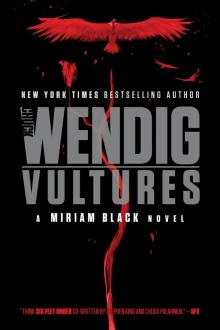 Vultures
Vultures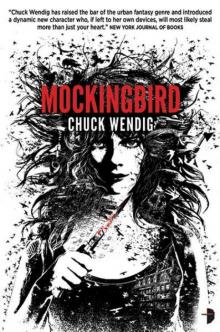 Mockingbird
Mockingbird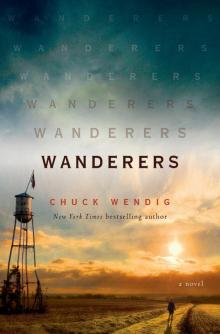 Wanderers
Wanderers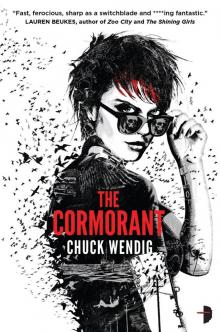 The Cormorant
The Cormorant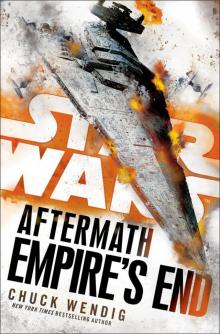 Empire's End: Aftermath (Star Wars)
Empire's End: Aftermath (Star Wars)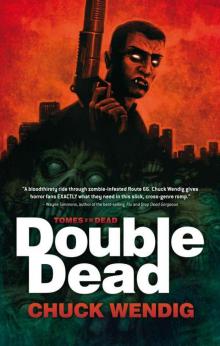 Double Dead
Double Dead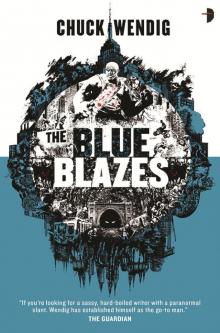 The Blue Blazes
The Blue Blazes 250 Things You Should Know About Writing
250 Things You Should Know About Writing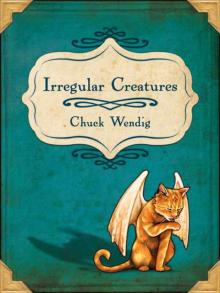 Irregular Creatures
Irregular Creatures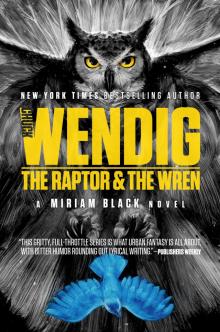 The Raptor & the Wren
The Raptor & the Wren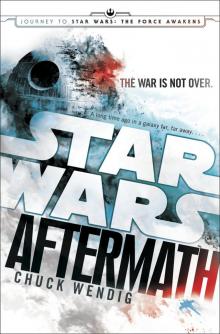 Aftermath: Star Wars
Aftermath: Star Wars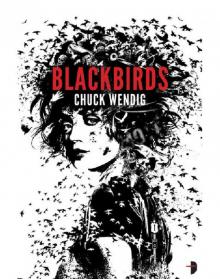 Blackbirds
Blackbirds The Hunt
The Hunt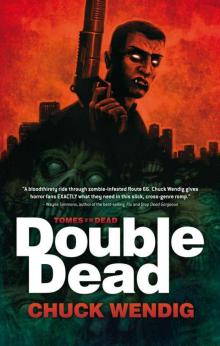 Tomes of the Dead (Book 1): Double Dead
Tomes of the Dead (Book 1): Double Dead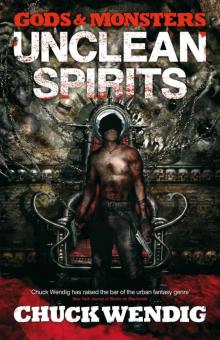 Gods and Monsters: Unclean Spirits
Gods and Monsters: Unclean Spirits The Harvest
The Harvest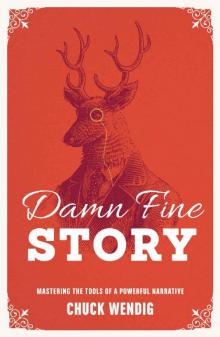 Damn Fine Story: Mastering the Tools of a Powerful Narrative
Damn Fine Story: Mastering the Tools of a Powerful Narrative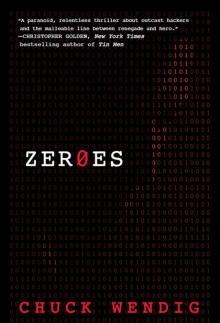 ZerOes
ZerOes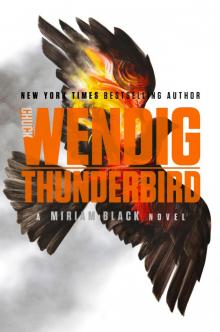 Thunderbird
Thunderbird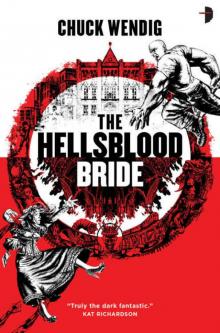 The Hellsblood Bride
The Hellsblood Bride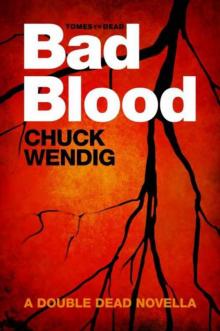 Double Dead: Bad Blood
Double Dead: Bad Blood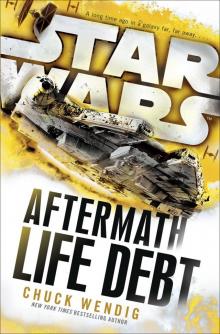 Life Debt
Life Debt